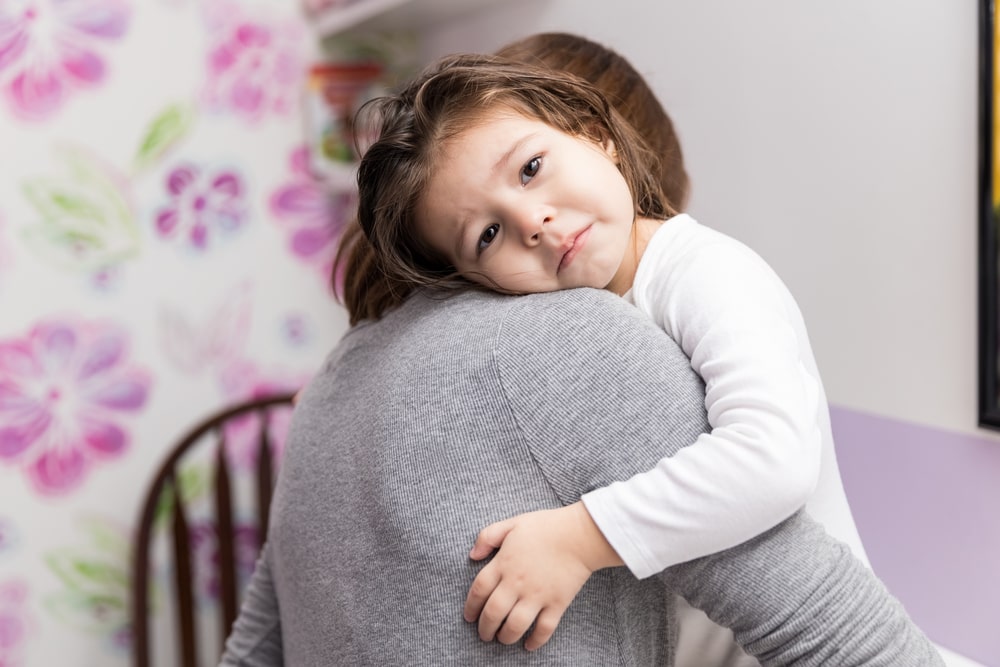Learning to talk is an exciting time in a toddler’s life. Little ones love that they can now communicate through words and parents love seeing their toddlers develop and having a better understanding of their child’s needs and personality. Also, how cute is toddler talk?
There is not a strict one-size-fits-all timeline when it comes to your baby learning to talk. However, there are certain milestones children are expected to hit by a specific age.
For example, two-year-olds should be saying approximately 50 words and be able to put together 2-word sentences. Each child develops at their own pace though and some children take a little longer than others to start talking.
Sometimes children as old as 3 can still not talk and parents may feel concerned that their child has a speech delay. Does your 3-year-old understand what you say but not talk about themselves?
There are many reasons why your 3-year-old may still not be talking and your pediatrician and a speech therapist will be able to help you to understand why your 3-year-old doesn’t talk, providing support and speech therapy if needed.
In this article, we will help parents understand why their 3-year-old isn’t talking, what a speech delay actually is, and provide details on what to do if your 3-year-old doesn’t talk but understands you.
When Should You Worry If Your Child Is Not Talking?
Do you really need to worry if your 3-year-old isn’t talking?
Before you start panicking about your child’s speech (or lack of) it is important to have an idea of how many words babies and toddlers should be saying at each stage of life. Here is a quick breakdown of toddler speech milestones.
12 months – 18 months
View in gallery
Toddlers between one and one and a half years old should be able to say approximately four different words. Children this age mostly communicate through non-verbal gestures but they will begin to imitate the words and sounds that they hear.
18 months-24 months
By this age, a child’s vocabulary should consist of approximately 50 words. It is common for toddlers to not be speaking much at 18 months and then experience a huge leap in their language before their second birthday.
2 years – 3 years
Between the age of two and three, your child’s speech should boom. Toddlers are typically expected to go from saying 50words at two years old to be able to say between 500 and 1000 words when they turn three.
During this period children will start putting 2-3 word sentences together, asking questions and their speech should be becoming much more accurate and understandable.
3 years plus
From 3 years onwards your child’s vocabulary should continue to grow from 1000+ words. Your toddler should be putting up to five words together to make more complicated sentences.
A 3-year-old should be able to tell you their name and age, tell stories, and should have learned to count and identify different colors.
3-year-old Speech Checklist
As you can see, a child’s speech improves at a rapid rate between the age of one and three. It can be hard to distinguish between a ‘late talker’ and a child with a speech delay if you don’t have the specific training required to notice the signs.
Here is a development and speech checklist for a 3-year-old to give you a better idea of if your child is on track or not.
At 3 years old your child should be able to:
- Correctly name familiar colors
- Understand the idea of same and different
- Pretend and fantasize more creatively
- Follow three-part commands
- Remember parts of a story
- Understand time better (morning/afternoon, day/night)Count, and understand the concept of counting
- Sort objects by shape and color
- Complete age-appropriate puzzles
- Recognize and identify common objects and pictures
View in gallery
If your child is doing all of the above then you shouldn’t be too concerned that your child has a speech delay.
However, if your child can understand a lot of the things you say (follows commands and points to objects you name, for example) but can’t say many words, they may have a speech delay that needs professional therapy to correct.
What Is A Speech Delay In 3-year-olds?
Unlike a language delay, where a child may be able to communicate verbally but can’t use words in the correct context or understand their meaning, children with a speech delay understand the words used by others but struggle to form the words themselves.
Language and speech delays are easily confused, the main difference between the two is a child’s ability to comprehend and understand the words used around them.
A child with a speech delay would easily understand the command ‘put your shoes on but may struggle when trying to say the word shoes themselves.
A child with a language delay may be able to say shoes easily but not be able to identify a shoe or understand what the command ‘put your shoes on’ means. Just because your 3-year-old isn’t saying 1000 words doesn’t necessarily mean they have a speech delay.
However, if you notice your toddler is saying a lot less than is to be expected and you are struggling to understand around 75% of the words they say then it is time to have their speech assessed by a professional.
My Toddler Understands But Won’t Talk – What Do I Do?
Your 3 year old won’t talk, what happens now? If you have noticed the signs of a speech delay in your child then you need to speak with your child’s pediatrician.
The doctor will be able to identify any red flags in your child’s development and if they are concerned they will refer your 3-year-old to a speech and language therapist.
View in gallery
The specialist will be able to thoroughly assess your child’s speech and develop a plan of therapy to help improve the speech delay.
Your three-year-old may require audiologist tests as well as the tests from the speech and language pathologist. Sometimes a speech delay can be caused due to hearing issues and it may take some time for the professionals to get to the root of your child’s speech delay.
Many parents are concerned their 3-year-old may have autism because they have a speech delay. Whilst delayed speech can be a result of autism in some children, many 3 years old don’t talk for other reasons.
What Causes A Speech Delay In Toddlers?
There could be one or a number of reasons why your three-year-old isn’t talking.
There are cases where a child is just taking their time to talk, there’s no worrying issue behind their delayed speech, they are just taking the whole learning to talk step really slowly and they are doing so quite happily.
Often though a speech delay can be linked to a development issue or other health problem. Here is a list of some of the reasons why your three-year-old may have a speech delay:
Developmental speech and language disorders
These learning disorders are caused by your child’s brain works differently. Your child may have trouble producing speech sounds, using spoken language to communicate, or understanding what other people say.
Hearing loss
Your child may not be able to talk simply because they can’t hear the words used by others correctly and clearly. We learn to talk by mirroring the sounds we hear so if your child’s hearing is impaired this will impact their ability to speak properly.
View in gallery
Neglect and abuse
Children who are neglected and do not spend any time talking to other people, will not learn to speak.
As stated above, a fundamental part of learning to talk is listening to the words and sounds used by others. It is not uncommon for children who have been abused and neglected in their early years to have some kind of speech delay.
Premature birth
Babies born prematurely can experience several health issues and developmental delays, including speech delays.
Neurological problems
Conditions like cerebral palsy, muscular dystrophy and traumatic brain injury can affect the muscles needed to speak correctly and clearly.
Autism Spectrum Disorders
Speech and communication issues can be an early sign of autism. However, not every child with autism can’t speak and not all children who can’t speak have autism. The autism spectrum is vast and includes a whole range of symptoms, speech delay just being one of them.
Apraxia
Children with Apraxia speech disorder have difficulty in sequencing and executing speech movements. This means they struggle to get their mouth and jaw to move in the correct way to forms words and sentences.
Selective mutism
Sometimes children will speak to their parents perfectly fine but won’t talk to other people or in certain situations.
Selective mutism can cause children to be unable to speak to their teachers or peers at school, for example. It could also be something that they will grow out of as they get older and become more confident.
When you take your child to see their doctor and to their referral with the speech specialist, they will be looking for signs of all of the above in your child and carry out tests accordingly.
View in gallery
However, sometimes some children just have delayed speech that can easily be fixed with speech therapy.
How To Help A 3-year-old Who Doesn’t Talk But Understands
While you are waiting for your child’s referral to a speech therapist, there are several things you can do to help your 3-year-old learn to speak.
Your speech therapist will give you specific exercises tailored to your child’s need but there are a few things you can try that will help to encourage your 3-year-old to talk.
Speak slowly and clearly
Don’t rush your words when you are speaking to your child. There is no need to talk at a snail’s pace but just take your time when chatting to your toddler, this gives your child more time to hear the words you are using.
Don’t pressure them
You need to be calm in your approach to helping your 3-year-old to talk more. Try not to get frustrated if they won’t answer your questions or engage in a little conversation with you.
Keep chatting away to your toddler regardless if they want to join in, the more speech they hear from others the better.
Read to them
Reading is an excellent way to encourage the development of speech and language in your toddler. Read to them often and try to gently encourage them to join in, ask them what they can see in the pictures, etc.
Prices pulled from the Amazon Product Advertising API on:
Product prices and availability are accurate as of the date/time indicated and are subject to change. Any price and availability information displayed on [relevant Amazon Site(s), as applicable] at the time of purchase will apply to the purchase of this product.
Sing nursery rhymes to them
Children don’t just have to hear spoken words, singing makes words more fun and you might even be able to encourage your toddler to sing along with you.
Model proper speech
If your child pronounces a word wrong, don’t draw attention to their mistake as this may knock their confidence. Instead, repeat the word back to them and pronounce it correctly.
For example, they say ‘Guggles’ and you say ‘Do you want to play with the bubbles?’, emphasize the B slightly but don’t make them feel bad for pronouncing it incorrectly.
Use nonverbal communication
You haven’t given up if you resort to using nonverbal communication like hand gestures and sign language when communicating with your child.
If you say the words as well as signing them, you are still giving your child to hear the words and over time they may speak when then sign too, before stopping with the hand gestures altogether.
The Final Thought
If your 3-year-old doesn’t talk but understands you, they may have a speech delay or they may just be taking their time to start talking. It can be very hard to tell the difference between a genuine speech problem and a late bloomer.
This is why you must always seek professional support from your child’s pediatrician if you have any concerns about your child’s development, this includes their inability to speak.
In many children, the speech delay can be rectified through speech and language exercises and activities that will be put into a plan by your child’s speech therapy specialist.
Being a parent is tough but we are here to support you and provide you with plenty of helpful information, check out our guide to parenting styles.







